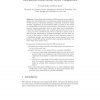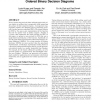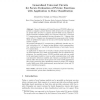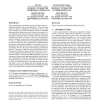24 search results - page 2 / 5 » Information-Theoretic Conditions for Two-Party Secure Functi... |
CRYPTO
2000
Springer
15 years 4 months ago
2000
Springer
Secure Function Evaluation (SFE) protocols are very hard to design, and reducibility has been recognized as a highly desirable property of SFE protocols. Informally speaking, reduc...
105
click to vote
CCS
2006
ACM
15 years 4 months ago
2006
ACM
Privacy-preserving protocols allow multiple parties with private inputs to perform joint computation while preserving the privacy of their respective inputs. An important cryptogr...
ICISC
2008
15 years 1 months ago
2008
Secure Evaluation of Private Functions (PF-SFE) allows two parties to compute a private function which is known by one party only on private data of both. It is known that PF-SFE c...
103
Voted
ACNS
2009
Springer
15 years 7 months ago
2009
Springer
Abstract. Two-party Secure Function Evaluation (SFE) is a very useful cryptographic tool which allows two parties to evaluate a function known to both parties on their private (sec...
123
click to vote
EDBT
2010
ACM
14 years 11 months ago
2010
ACM
Private matching between datasets owned by distinct parties is a challenging problem with several applications. Private matching allows two parties to identify the records that ar...




